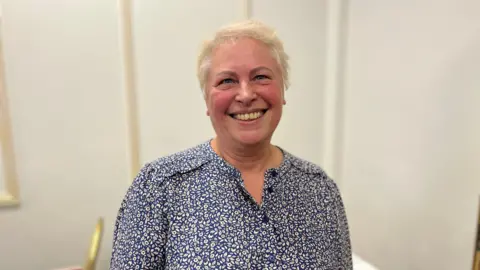People 'living hand to mouth' due to housing costs
 BBC
BBCStruggling to pay rent and the removal of medium term employment permits are issues that workers who have relocated to Guernsey hope are addressed by the next States.
About 12% of Guernsey's population was born overseas according to the 2023 census, and the BBC spoke to some of them about the issues affecting them ahead of the general election on 18 June.
According to the States, 3,424 people were working in the island with employment permits in June 2024, about a 28% increase since June 2020.
The latest States figures revealed the average cost of rental properties was £2,068 a month in the first quarter of 2025, up 51.7% since the same period in 2020.
'Hand to mouth'
Social worker Emily Piki moved to the island less than two years ago.
"There's not enough to accommodate everyone, all the people that are coming, because there's no doubt that there's many foreigners coming in from other places but it really is hard to find accommodation," she said.
"A one-bedroom flat for example is £1,800, and that's not including bills, and if you look at the minimum wage on your basic hours that is just enough to cover just the rent, maybe not even the bills."
"People are living hand to mouth and that's not ideal."
Research by specialists arc4 showed that average property prices were over 16 times more than average earnings in 2022.
A study in May by the Guernsey Community Foundation found that about 3,200 residents were regularly choosing between heating and eating.
Khoy Rulamin, who works in hospitality, criticised the island's move away from medium term employment permits, saying short term permits denied access for family members while jobs that allowed long term permits were hard to find.
"Now, because its long term, there's few positions for long term so I have to be a second chef or head chef and then I can get long-term and I can bring my wife," he said.
"That's the problem, but now I have a short term licence and I can't bring my wife here.
"There are lots of people like this."

Isabel de Menezes, who moved to Guernsey from Portugal in 1979, wanted the island to be an attractive place for young people to live.
"It's important that we have an island for our children and our grandchildren no matter where they came from," she said.
"It's important that they want to stay here, the same as I did," she said.
"I only came originally thinking I'd stay for five years and I've stayed because of this wonderful place. I've worked hard, I've paid my taxes, I've paid my dues.
"I want people to want to be here, want to come back, want to work, want to make the island better and keep this wonderful place that we've got, this magic little island."
She called for a balance of new candidates and previous expertise in the next States.
"If we get rid of too many just because, then we're going to end up with a bunch of inexperienced politicians who take a couple of years to get into the system," she said.
People must have lived in the island for at least two years before being eligible to register on the electoral roll, or for a total of five years any time before registering.
Follow BBC Guernsey on X and Facebook and Instagram. Send your story ideas to [email protected].
